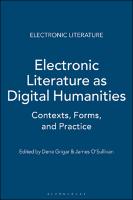Electronic Literature as Digital Humanities
Contexts, Forms, and Practices
Contributor(s)
Grigar, Dene (editor)
O’Sullivan, James (editor)
Language
EnglishAbstract
This book is available as open access through the Bloomsbury Open programme and is available on www.bloomsburycollections.com. Electronic Literature as Digital Humanities: Contexts, Forms & Practices is a volume of essays that provides a detailed account of born-digital literature by artists and scholars who have contributed to its birth and evolution. Rather than offering a prescriptive definition of electronic literature, this book takes an ontological approach through descriptive exploration, treating electronic literature from the perspective of the digital humanities (DH)––that is, as an area of scholarship and practice that exists at the juncture between the literary and the algorithmic. The domain of DH is typically segmented into the two seemingly disparate strands of criticism and building, with scholars either studying the synthesis between cultural expression and screens or the use of technology to make artifacts in themselves. This book regards electronic literature as fundamentally DH in that it synthesizes these two constituents. Electronic Literature as Digital Humanities provides a context for the development of the field, informed by the forms and practices that have emerged throughout the DH moment, and finally, offers resources for others interested in learning more about electronic literature.
Keywords
Digital; literature; electronic; ontological approach; digital humanities; technology; development; e-poetry; database; cyberfeminist; augmented reality; bots; hypertextDOI
10.5040/9781501363474ISBN
9781501363481, 9781501363498, 9781501363481Publisher
Bloomsbury AcademicPublisher website
https://www.bloomsbury.com/academic/Publication date and place
New York, 2021Imprint
Bloomsbury AcademicSeries
Electronic Literature,Classification
Literature: history and criticism
Technology: general issues
Media studies


 Download
Download